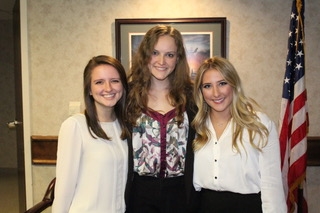
Several University of Arkansas nursing students will serve as delegates to the National Student Nurses' Association meeting next spring, and one student recently won a scholarship from the association's Arkansas chapter.
Emily Dixon, a member of the U of A Student Nurses' Association in the Eleanor Mann School of Nursing, is drafting a resolution in support of students living in the United States under the Deferred Action for Childhood Arrivals program being able to take nursing licensing exams in every state. People with the federal DACA status are not eligible to apply for licensure.
President Donald Trump suspended the temporary protections against deportation afforded by DACA earlier this year and gave Congress until March to find a permanent solution to the issue of the 800,000 young immigrants brought to the United States as children and living here illegally.
Dixon and five other students — Sydney Barnes, Kristen Eldridge, Shelby Everett, Maryann Fenwick and Britley Pierce — were elected by the U of A chapter of the Student Nurses' Association to serve as delegates to the national convention. Dixon, Eldridge and Everett were elected at the state meeting to serve as the new Arkansas Nursing Students' Association state board.
Also at the state meeting, Grace Davis of Memphis received a scholarship from the association. Davis, who plans to graduate from the U of A in May, has accepted a job at the Mayo Clinic in Rochester, Minnesota, to work in the oncology and hospice unit. She worked in the unit for 10 weeks last summer on an externship. Davis is vice president of the U of A chapter of the Student Nurses' Association.
Students at the national association meeting will vote on resolutions proposed by delegates. A resolution is a written statement that, when adopted by the House of Delegates, is the basis for the policies and actions of the National Student Nurses' Association.
"These are the standards for nurses," Davis said. "When we have a question in our practice, we refer to resolutions and statements published by the association."
Dixon, who is a senior from Blytheville, also serves as legislation, nominations and elections chair on the state board. Her resolution is titled "Bringing Awareness to All Nursing Organizations in Support of Taking Action to Defend DACA (Deferred Action for Childhood Arrivals)."
The U of A nursing program does not consider DACA status in the admission process and is not aware of any students currently enrolled in the nursing program with DACA status. Some are enrolled in other Arkansas nursing education programs.
"There is a nursing shortage everywhere," Dixon said. "You can see that firsthand when you step into any hospital or clinical site. I really don't see how we can turn away people who want to help. It would be so upsetting not to be able to sit (for the licensure exam). These students (with DACA status) are just as qualified as the rest of us. I can't imagine being in that position after having worked that hard."
Dixon cited research that the DACA program increases wages and labor force participation of immigrants and benefits the U.S. economy.
"Instead of coming here and not being able to get work, these immigrants can get an education, get jobs, provide for their families," she said. "That's why they come to America."
Dixon said it's important for students to be involved in discussions about their profession and public health.
"I see this position as my opportunity to make a small change in the nursing community I hope to one day be a part of," she said. "In nursing school, we learn that a nurse's job is to be an advocate for our patients. We treat people that are sick and injured as well as provide emotional support for them and their families. Not allowing nursing students protected under DACA to become nurses is equivalent to denying them the ability to help others just because of where they happened to be born."
Topics
Contacts
Heidi S. Wells, director of communications
College of Education and Health Professions
479-575-3138,